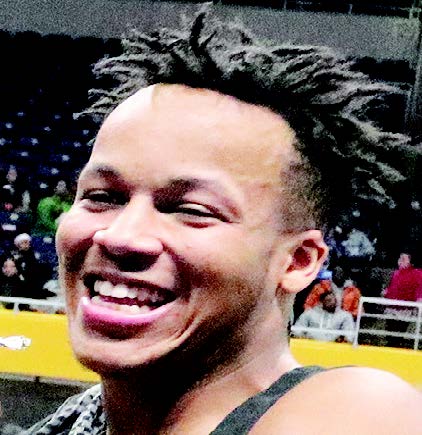by Rob Taylor Jr.
Courier Staff Writer
Quick!…You’ve been contracted to inspect towers located approximately 4NM southwest of the Sioux City, Iowa, airport operating an unmanned aircraft. What is the maximum altitude above ground level that you’re authorized to operate over the top of the towers?
Exactly.
Try 60 of these types of questions coming at you during the Federal Aviation Administration’s knowledge test you must pass in order to fly a drone legally for commercial purposes in the U.S.
You better know your stuff.

DASHON CRUSE
Dashon Cruse, a recent graduate of University Prep High School (Pittsburgh Milliones), knows his stuff.
On Oct. 13, Cruse, who will turn 19 on Dec. 6, walked into the Allegheny County Airport in West Mifflin, and two hours later, walked out as a licensed commercial drone operator.
Of course, it wasn’t that easy. But Cruse told the New Pittsburgh Courier he was determined to make history.
It’s believed that Cruse is the lone certified African American male drone operator in Pittsburgh between the ages of 16 and 40. Look up in the sky, and one may find a drone being operated by a person, but it could be for recreational purposes, in which a person does not need to be certified. But in order to operate a drone legally for commercial purposes, one must be a certified operator, which includes passing a two-hour, 60 question knowledge test. If you answer 75 percent of the questions correctly, you’ve passed the test.
Cruse, who also played football and basketball in high school, became interested in drones after the organization M-PowerHouse did a presentation on them at U-Prep in Nov. 2019, during his senior year.
“I was probably one of the only people interested in it in my school,” Cruse told the Courier in an exclusive interview, Nov. 20. “I did my own research and I saw the benefits in how technology is about to take over, and it was something different. I just like being different, so I just took it upon myself to get the license.”
Cruse hooked up with Terry Smith, president and CEO of M-PowerHouse, to get the materials necessary to take the test. Cruse said he had the information in February, but didn’t begin studying it until August. “I studied it for two months,” he said.
Cruse said much of the material one has to know about flying drones concerns weather. “You have to learn the same stuff as a meterologist a little bit,” he said. “Cold fronts, warm fronts, and you have to learn sectional charts, the same charts that regular airplane (pilots) use. It’s a lot of studying you have to do.”
Cruse, who graduated from U-Prep in June with a 3.5 GPA, passed the FAA Drone Knowledge exam on his first try.
“All that studying paid off, and I knew I made history,” Cruse told the Courier.
M-PowerHouse played a vital role in Cruse’s progression, as the organization constantly connects Pittsburgh youth to careers and educational opportunities in STEAM-related fields. M-PowerHouse has drone professionals who instruct students, and it provides the safety helmets, vests and materials. Students like Cruse get an opportunity to fly the drones through obstacle courses and cover material to prepare them to take the exam. Smith said M-PowerHouse seeks to turn disparity to parity, by getting corporations such as Amazon, Wal-Mart, FedEx, UPS, the Armed Forces and others to begin to recruit African American drone pilots.
And licensed drone operators can make quite the living. As freelance contractors, they can gather thermal images of the ground, produce 3-D models of buildings, and everything in between. An article published on Marketwatch.com in 2018 featured independent drone operators who made six-figure incomes. It’s not all fun and games, though. Licensed drone operators have to invest in their business. Do you have the best drone available? What is your specialty? Is there an oversaturation in drone operators in a particular city? Do you carry insurance on your drone? All of these questions are vital in understanding just how financially successful one can be in the drone operator business.
According to the FAA, there are about 200,000 certified drone operators, or remote pilots, in the U.S. There are 1.7 million registered drones, with 500,000 of them used for commercial purposes.
When it comes to diversity in commercial drone operators, you better get a high-tech magnifying glass. There is a severe dearth of certified Black drone operators nationally, though there are those such as Carmaine Means and Jae S. Brown who want to spread their knowledge of the unmanned aircraft systems business to fellow African Americans. Means is known as the “Drone Girl” in the Chicago area, while also working as a photojournalist at a TV station there. Brown is the leader of Vekter Management, which prepares people for advancement in the industry.
Cruse told the Courier he’s preparing to launch his LLC, Superfly Drone Services, in which he’ll be able to provide different services as a licensed drone operator.
Cruse’s advice to other young people looking to gain new skills in this crazy world called life: “Never settle,” he said. “Be yourself, and whatever you want to do, put your mind to it.”